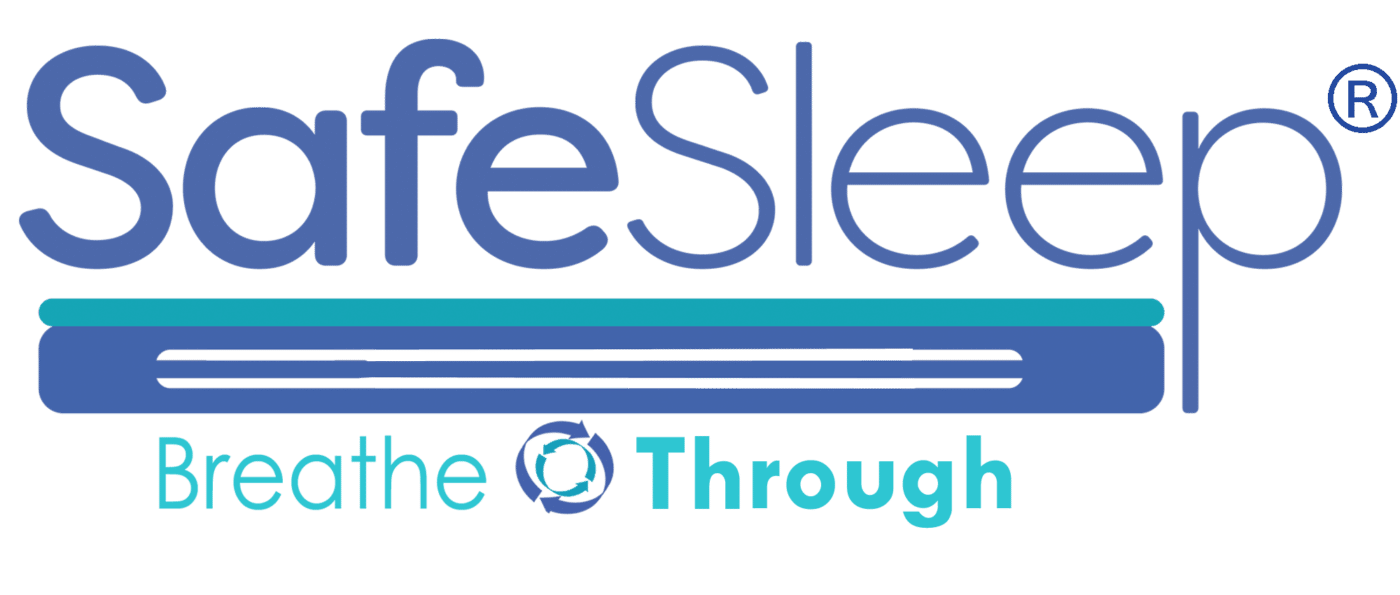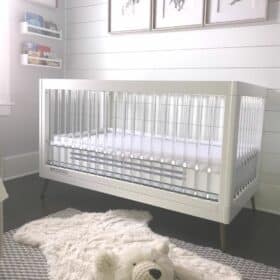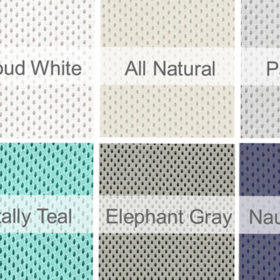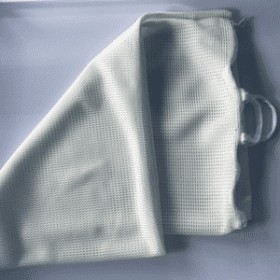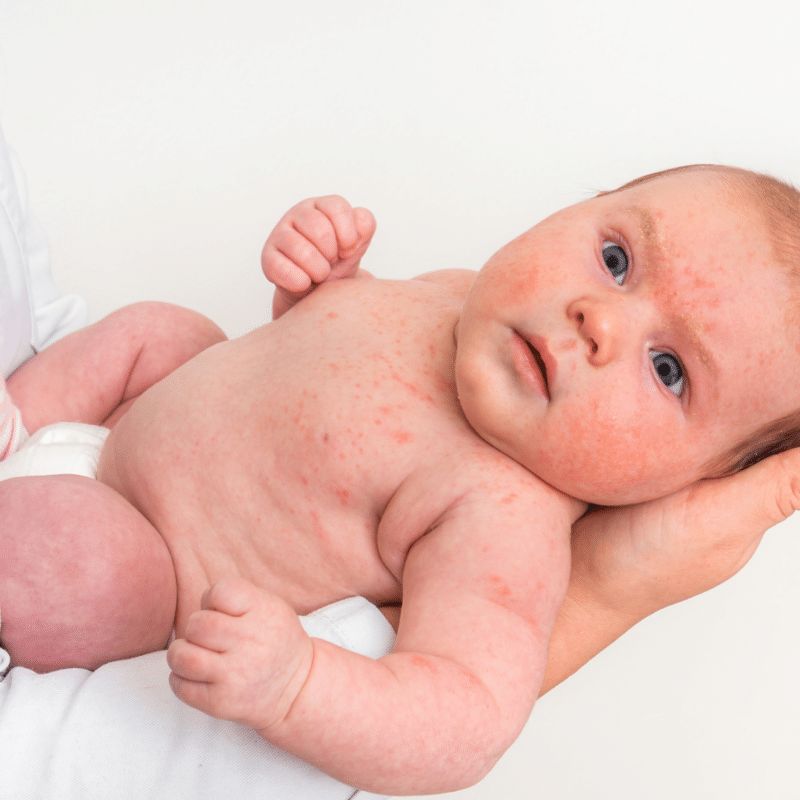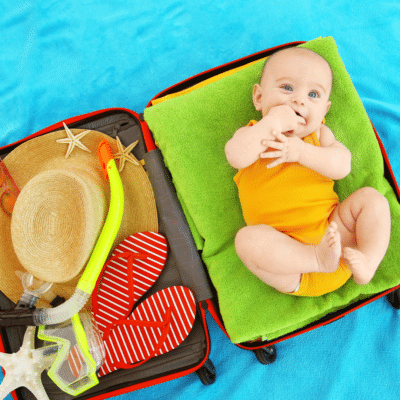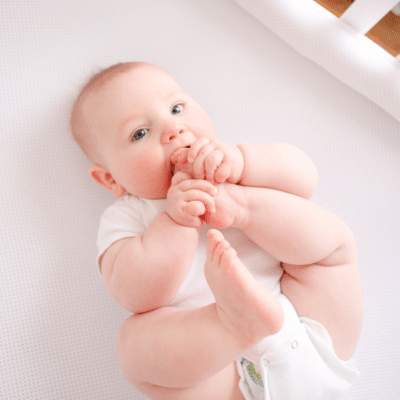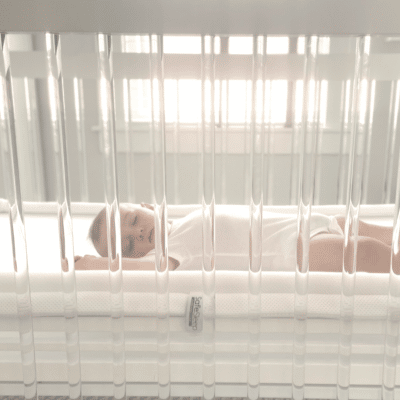No products in the cart.
Baby Sleep
Infants with Eczema & Sleeping
It can often be difficult for infants with Eczema to get to sleep and remain sleeping for extended periods of time.
What is Eczema?
Eczema, also known as atopic eczema or atopic dermatitis, is an inherited condition that usually results in dry, itchy, red patches on the skin. The body parts most affected by eczema are hands, feet, elbows, face, and the back of the knees.
Symptoms of Eczema?
Eczema is a common condition among babies. Infants with Eczema often have painful and itchy flare-ups which can have adverse effects on their sleep. If your baby has not been diagnosed with eczema, then consult your dermatologist or pediatrician to find out if your infant has Eczema.
What Triggers Flare Ups?
If you baby has been diagnosed with eczema, here are some helpful tips on how to prevent flare ups and help your baby sleep better. an Infant’s Eczema flare ups are usually triggered by certain foods or environmental elements. Often these triggers can be identified with a little bit of trial and error.
When your Infant’s eczema flares up, the skin most commonly becomes inflamed and red. These flare ups are most often immediate after your baby consumes certain foods or when he/she comes in contact with a certain exterior or interior element.
Many infant eczema flare-ups are caused by chemicals that are not suitable for your baby’s sensitive skin.
An infant’s Eczema is very distressing to them. It is very difficult for older babies with Eczema to avoid scratching. Scratching eczema affected skin can lead to abraded skin which can cause infection.
Infant’s with Eczema are often very uncomfortable during flareups, and most often results in interrupted sleep if not treated.
Tips for Better Sleep During Your Infant’s Eczema Flare Ups
Here are some simple steps you can take to sooth your baby’s Eczema for a calm relaxing sleep:
Give your baby a bath before going to bed.
This helps to soothe your Infant’s eczema and hydrate the dry itchy skin. Bathing will also help to get rid of the bacteria and germs which cause itching and rashes. But, be sure to avoid hot water.
A hot water bath makes your Infant’s eczema worse as heat triggers flare ups. It will make the skin dry, causing more itching.
Try using a calming mixture of lukewarm water and Aveeno Baby Soothing Bath Treatment.
Aveeno Baby Soothing Bath Treatment consists of ultra finely milled natural colloidal oatmeal and moisturizers to relieve dry, itchy and irritated skin. It is also hypoallergenic.
When dispersed in water, the powder forms a milky bath that soothes and cleanses. Avoid harsh soaps that are drying to the skin. You may also want to use a gentle moisturizer, free of dyes and perfumes, on your baby’s skin after their bath.
Add a humidifier in your baby’s room to keep the air hydrated.
The hydrated skin will not only assist with keeping baby’s skin moist, it will also help eliminate itching and redness.
Use a SafeSleep® Breathe-Through Crib Mattress.
Using a SafeSleep Breathe-Through Crib Mattress will help keep your baby’s core body temperature stable so they don’t sweat. Sweating can actually have adverse effects with Eczema causing more irritation and soreness. It is important to keep your baby’s skin dry.
A Breathe-Through Crib Mattress eliminates the build up of moisture on the surface unlike crib mattresses with cores and fillers. Fiberfill or vinyl covers cause baby to artificially overheat and sweat.
Sweating will exasperate your baby’s eczema. An air permeable crib mattress with constant air flow helps promote good sleep even during Eczema flare ups.
Be sure to keep pets at bay.
Do not allow pets or animals near your baby as this will worsen the condition. During flare ups, keep your baby’s room door shut to prevent pets from entering your baby’s sleep space.
Eczema in infants usually starts at around 6 months.
Watch for signs. There is a good possibility your baby’s eczema is triggered by certain foods. Take note if they have a skin irritation after eating and avoid their consumption of suspect foods.
The best thing about eczema is that the babies will normally outgrow it when they are 4-5 years of age.
Related Topics
